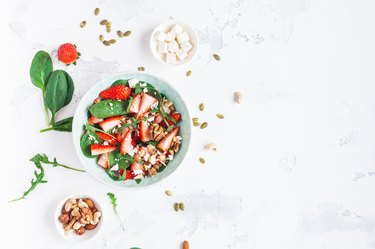
Low-carb diets continue to be a popular choice among people who want to lose weight. These diets restrict carbohydrates well below the amounts recommended by the mainstream medical community, and some of them involve eating 20 grams or fewer of carbs each day. How many carbs you need depends on your daily calorie needs and activity level. If you decide to go low carb, it's crucial to choose high-quality carb sources to maintain your energy and health.
How Low Can You Go?
Video of the Day
The generally recommended daily allowance or RDA for carbohydrates for healthy adults is 130 grams per day or 45 to 65 percent of calories. Technically, anything less than that would be considered low carb. However, many low-carb diets call for a daily carb intake significantly below the RDA. For example, the Atkins 20 and Atkins 40 diets include 20 and 40 grams of carbs daily, respectively.
Video of the Day
A moderately active adult female needs about 2,000 calories per day. That means as little as 4 percent of her daily calories would come from carbs. Keep in mind that most low-carb diets only count net carbs, which is the total carbs minus dietary fiber and sugar alcohols.
Read more: Negative Side Effects of a Low-Carb Diet
High-Quality Carbohydrates
The most important part of maximizing your carb allowance and staying healthy while dieting is choosing high-quality, low-carbohydrate foods. Primarily, this means nonstarchy, low-sugar fruits and vegetables, such as:
- Kale
- Spinach
- Broccoli
- Bell peppers
- Carrots
- Cauliflower
- Green beans
- Avocado
- Tomatoes
- Berries
You can also eat nuts and seeds and full-fat dairy products. Bread, pasta and other grains are off-limits as well as high-sugar fruits and anything that contains added sugar. Eating even one of the off-limits foods can boost you over your carb allotment for the day.
Getting Enough to Stay Healthy
Diets that urge you to cut out or severely limit categories of foods, such as carbohydrates, are referred to by the mainstream medical community as "fad diets." These diets promise quick weight loss or make other health claims that usually aren't supported by scientific research. They may lead to nutrient deficiencies and even encourage eating disorders. Typically, these diets are short-lived, and once dieters go back to their normal eating patterns, they tend to gain back whatever weight they lost — and sometimes even more.
How many carbohydrates you need depends largely on your activity level. The more active you are, the more carbohydrates you need. Carbohydrates are your main source of fuel or energy. The premise of low-carb diets is that in the absence of carbs, your body begins to burn fat for energy. However, your body will burn fat no matter how many carbs you eat each day, if your calories consumed stay below your calories expended through physiological function, daily activities of living and exercise.
Whether you choose to eat 130 or 20 grams of carbs each day, it's important — for weight loss and for overall health — that those carbs come from quality sources, such as fruits, vegetables, whole grains, and nuts and seeds. Steer clear of processed and refined foods, such as frozen pizzas, baked goods and white bread, pasta and rice. These foods are high in sugar or simple carbs that your body digests just like sugar, and they provide little nutritional value. These foods, more than the amount of carbs you eat, are responsible for weight gain.
Read more: Healthy Low-Carb Eating Plan
- National Academy of Medicine: Dietary Reference Intakes: Macronutrients
- Atkins: Atkins 20® Low Carb Diet Facts
- Dietary Guidelines 2015-2020: Appendix 2. Estimated Calorie Needs per Day, by Age, Sex, and Physical Activity Level
- Perfect Keto: What Are Net Carbs? The Difference Between Effective and Non-Impact Carbs
- Diet Doctor: Low-Carb Foods — What to Eat
- American Council on Science and Health: Fad Diets Are Bad Diets
- Rush Health & Wellness: The Skinny on Low-Carb Diets
- Atkins: Atkins 40® Diet Facts